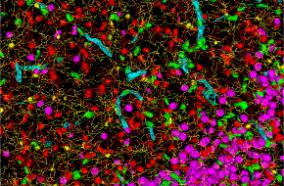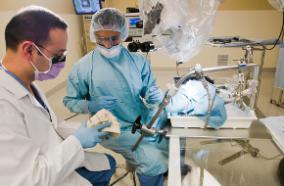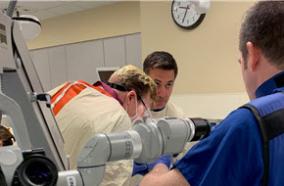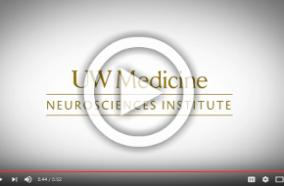4 years 3 months ago
Intussusception is the most common cause of bowel obstruction in infants four to ten months old and is commonly idiopathic or attributed to lymphoid hyperplasia. Our patient was a 7-month-old male who presented with two weeks of intermittent abdominal pain associated with crying, fist clenching and grimacing. Ultrasound demonstrated an ileocolic intussusception in the right abdomen. Symptoms resolved after contrast enemas, and he was discharged home. He re-presented similarly the next day and...
Gwyneth A Sullivan
4 years 4 months ago
CONCLUSION: In this large cohort of ICI-treated patients, a higher risk was observed for skeletal myopathies and elevation in CK levels in patients undergoing concurrent statin therapy. Prospective observational studies are warranted to further elucidate the potential association between statin use and ICI-associated myopathies.
Zsofia D Drobni
4 years 4 months ago
Certain clinical indications and treatments such as the use of rasburicase in cancer therapy and 8-aminoquinolines for Plasmodium vivax malaria treatment would benefit from a point-of-care test for glucose-6-phosphate dehydrogenase (G6PD) deficiency. Three studies were conducted to evaluate the performance of one such test: the STANDARD™ G6PD Test (SD BIOSENSOR, South Korea). First, biological interference on the test performance was evaluated in specimens with common blood disorders, including...
Sampa Pal
4 years 4 months ago
OBJECTIVE: Our purpose was to characterize neuropsychological evaluation (NP) outcome following functional hemispherectomy in a large, representative cohort of pediatric patients.
Hillary A Shurtleff
4 years 4 months ago
In the neocortex, subcerebral axonal projections originate largely from layer 5 (L5) extratelencephalic-projecting (ET) neurons. The unique morpho-electric properties of these neurons have been mainly described in rodents, where retrograde tracers or transgenic lines can label them. Similar labeling strategies are infeasible in the human neocortex, rendering the translational relevance of findings in rodents unclear. We leveraged the recent discovery of a transcriptomically defined L5 ET neuron...
Brian E Kalmbach
4 years 4 months ago
CONCLUSIONS: Primary ETV can safely improve symptoms of gait and cognitive dysfunction in adults with chronic obstructive hydrocephalus. Gait velocity and global cognition were significantly improved, and the worsening of either was rare following ETV.
Thomas J Zwimpfer
4 years 4 months ago
OBJECTIVE: While prior studies have found parental socioeconomic status (SES) affects the outcomes of pediatric traumatic brain injury (TBI), the longitudinal trajectory of this effect is not well understood.
Mark R Zonfrillo
4 years 4 months ago
Although least chipmunks (Neotamias minimus) are a widely distributed North American species of least concern, the southernmost population, N. m. atristriatus (Peñasco least chipmunk), is imperiled and a candidate for federal listing as a subspecies. We conducted a phylogeographic analysis across the N. minimus range to assess genomic differentiation and distinctiveness of the N. m. atristriatus population. Additionally, we leveraged the historical component of sampling to conduct a temporal...
Emily E Puckett
4 years 4 months ago
CONCLUSIONS: Our study showed that this three-in-one DL module for assessing image quality, field of view, and laterality of the eye of retinal photographs achieved excellent performance and generalizability across different centers and ethnicities.
Vincent Yuen
4 years 4 months ago
[Figure: see text].
Joshua D Burks
4 years 4 months ago
CONCLUSIONS: This trial of hypothermia after acute SDH evacuation was terminated because of a low predictive probability of meeting the study objectives. There was no statistically significant difference in functional outcome identified between temperature groups.
Georgene W Hergenroeder
4 years 4 months ago
CONCLUSION: High-resolution flat-detector computed tomography (HR-FDCT) improves visualization of the fine structures of intracranial stents deployed for symptomatic ICAS compared with that visualized using conventional FDCT. High-resolution flat-detector computed tomography improves assessment of stent deployment and could reduce the risk of complications.
Tengfei Li
4 years 4 months ago
We have presented the case of a right radial artery aneurysm (RAA) in a 27-year-old man with cerebral and coronary artery aneurysms and features of Parkes-Weber syndrome (port-wine stains and right upper extremity arteriovenous malformation and overgrowth). The RAA was repaired with an interposition great saphenous vein bypass graft. Analysis of the intracranial artery aneurysm and affected skin demonstrated a somatic mutation in the platelet-derived growth factor receptor-β gene. Mosaicism was...
Sherene Shalhub
4 years 4 months ago
CONCLUSIONS: Implementation of a systematic patient intake workflow and in-clinic GTS resulted in the highest reported real-world rate of germline testing for patients with pancreatic cancer. Health care disparities were identified and will guide future innovation. This report provides a model for other centers to create a similar testing infrastructure.
Evan J Walker
4 years 4 months ago
CONCLUSIONS: Current therapeutic modalities for management of dAVFs without CVD may provide better symptom control when complete angiographic occlusion is achieved.
Edgar A Samaniego
4 years 4 months ago
CONCLUSIONS: With more than 1000 patients, the CONDOR registry represents the largest registry of cranial dAVF patient data in the world. These unique, well-annotated data will enable multiple future analyses to be performed to better understand dAVFs and their management.
Ridhima Guniganti
4 years 4 months ago
CONCLUSIONS: Recurrence of dAVFs after putative cure can occur after endovascular treatment. Risk factors include tentorial location, cortical venous drainage, and deep cerebral drainage. Multimodality therapy can be used to achieve cure after recurrence. A delayed long-term angiographic evaluation (at least 1 year from cure) may be warranted, especially in cases with risk factors for recurrence.
Isaac Josh Abecassis
4 years 4 months ago
CONCLUSIONS: Patients with dAVF have a similar risk of harboring a concomitant intracranial aneurysm unrelated to the dAVF (5.3%) compared with the general population (approximately 2%-5%) and a rare risk (0.9%) of harboring an FRA. Only 50% of FRAs are intradural. Dural AVF+ patients have differences in dAVF angioarchitecture. A subset of dAVF+ patients harbor FRAs that may regress after dAVF treatment.
Isaac Josh Abecassis
4 years 4 months ago
CONCLUSION: Symptomatic carotid atherosclerosis was associated with elevated cytokines in TIA patients after controlling for other sources of inflammation. High-sensitivity CRP was associated with recurrent ischaemic stroke at 90 days. These findings implicate acute plaque inflammation in the pathogenesis of cerebral thromboembolism and support a rationale for randomized trials of anti-inflammatory therapy for stroke patients, who were excluded from coronary trials.
Sarah Coveney
4 years 4 months ago
Plastic surgery is growing in popularity. Despite this, there has been little exploration to date regarding the psychosocial consequences of seeking plastic surgery. Our study investigated how women seeking plastic surgery are perceived by others. We presented a random sample of 985 adults (men = 54%, Mage = 35.84 years, SDage = 10.59) recruited via Amazon's Mechanical Turk with a series of experimental stimuli consisting of a photographed woman (attractive versus unattractive) and a vignette...
Sarah Bonell
"university of washington"[affiliation] and neurological surge...: Latest results from PubMed
More posts about UW Neurological Surgery Recent PubMed Publications



















